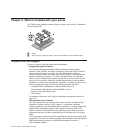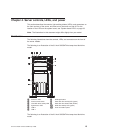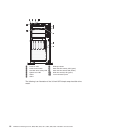
Some models support memory mirroring. Memory mirroring replicates and stores
data on two pairs of DIMMs within two channels (channel 0 and 1)
simultaneously. If a failure occurs, the memory controller switches from the
primary pair of memory DIMMs to the backup pair of DIMMs. To support memory
mirroring, you must install a pair of DIMMs at a time. One DIMM must be in
channel 0, and the mirroring DIMM must be in the same slot in channel 1. For
more information, see 91.
v RAID support
The ServeRAID adapter provides hardware redundant array of independent disks
(RAID) support to create configurations. The standard RAID adapter provides
RAID levels 0, 1, and 1E. The optional RAID adapters are available for purchase
and provide RAID levels 0, 1, 5, 6, 10, 50, and 60. See “Installing an adapter” on
page 96 and “Using the LSI Configuration Utility program” on page 143 for more
information about supported adapters and creating RAID arrays.
v Symmetric multiprocessing (SMP)
The server supports up to two Intel Xeon microprocessors. Each microprocessor
provides symmetric multiprocessing capability. When you install the second
microprocessor, this will enhance the performance of the server.
v Systems-management capabilities
The server comes with an integrated management module (IMM). When the IMM
is used with the systems-management software that comes with the server, you
can manage the functions of the server locally and remotely. The IMM also
provides system monitoring, event recording, and network alert capability. The
systems-management connector on the rear of the server is dedicated to the
IMM. The dedicated systems-management connector provides additional security
by physically separating the management network traffic from the production
network. You can use the Setup Utility to configure the server to use a dedicated
systems-management network or a shared network.
v TCP/IP offload engine (TOE) support
The Ethernet controllers in the server support TOE, which is a technology that
offloads the TCP/IP flow from the microprocessor and I/O subsystem to increase
the speed of the TCP/IP flow. When an operating system that supports TOE is
running on the server and TOE is enabled, the server supports TOE operation.
See the operating-system documentation for information about enabling TOE.
The Windows operating system requires that the Windows Scalable Network
Pack (SNP) be installed for TOE support.
Note: As of the date of this document, the Linux operating system does not
support TOE.
Specifications
The following information is a summary of the features and specifications for
machine types 3724, 3808, 3809, 3815, 3817, 3824, 3826, 3836. Depending on the
server model, some features might not be available, or some specifications might
not apply.
Chapter 3. What is included with your server 9


















